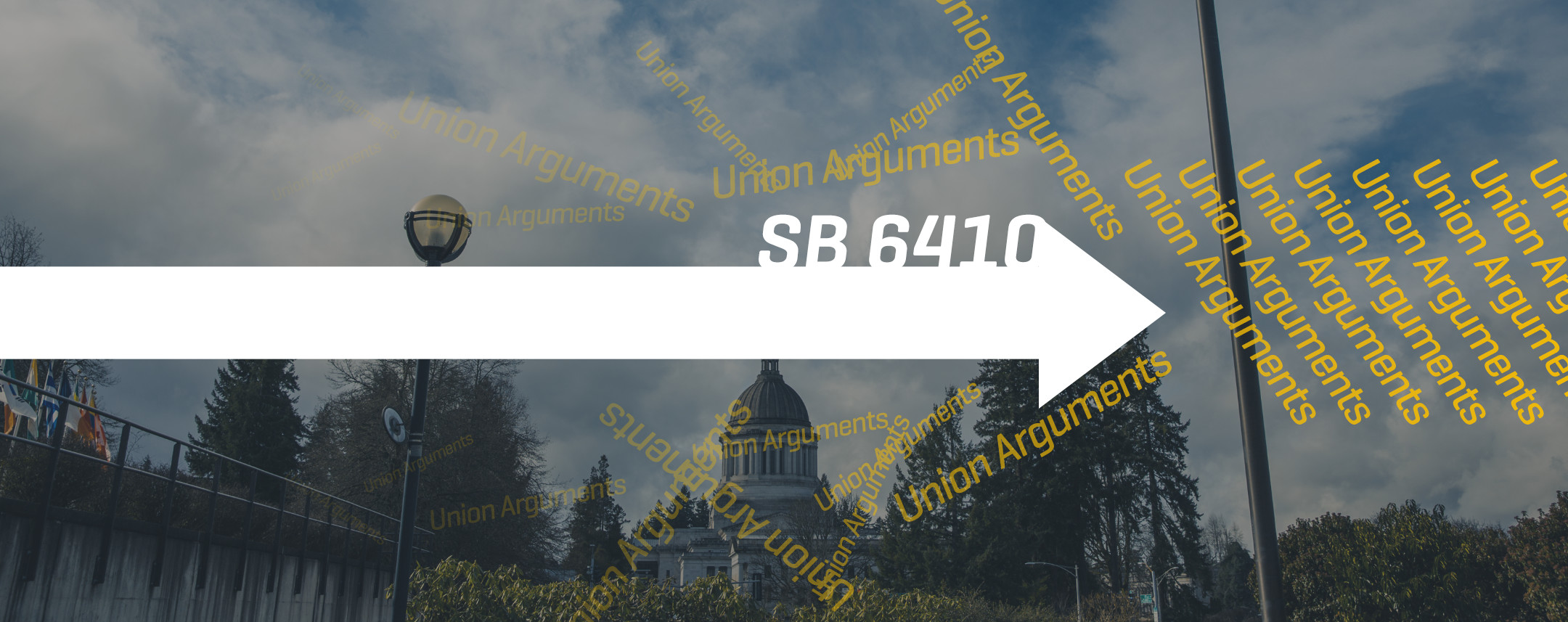Imagine if, once elected, a politician could serve indefinitely without having to stand for election, and the only way to remove the politician was for citizens to gather enough signatures to trigger a recall election and try to “vote the bum out?”
While politicians might enjoy the arrangement, most people would be outraged. Few would dare to describe such a process as “democratic.”
Unfortunately, Washington’s unionized public employees find themselves in just such a situation.
Legislation introduced by state Sen. Mike Hewitt (R-Walla Walla) seeks to bring democracy and accountability to Washington’s government unions by allowing public employees to periodically vote on their union representation.
Under current law, there are two ways for a union to be certified to represent a bargaining unit of public employees.
First, the state Public Employment Relations Commission (PERC) may hold an election in which the members of the bargaining unit vote on whether to unionize. Majority rules.
Second, through the “cross-check” process, union organizers may pressure individual public employees to sign bargaining authorization cards. Once the union has collected enough cards, it turns them in to PERC and is certified as the exclusive representative for the bargaining unit without an election.
In either case, once a union has been certified, it need never again stand for election. Effectively, unions are certified to act as near-permanent monopoly providers of workplace representation.
Under current law, public employees wishing to change or get rid of their union must persuade 30 percent of employees in a bargaining unit to sign statements within 12 months calling for an election and submit the appropriate paperwork during a 30-day window that occurs once every two or three years. If successful, PERC will hold a secret-ballot election in which a majority vote will determine whether to change unions or decertify the existing union.
The difficulties involved in calling for an election mean that most public employees have simply inherited their union representation without the opportunity to vote about whether to be union represented and, if so, what union to be represented by.
At the school district level, for instance, most unions representing classified employees and teachers were certified nearly 50 years ago in the 1960s and ’70s and have not had a vote since.
Some unions were certified more recently, such as the four statewide bargaining units of partial-public employees. Yet these workers face nearly impossible hurdles should they wish to decertify or change unions.
For instance, the 35,000 home care aides represented by SEIU 775 are scattered in homes around Washington without any common workplace or means of communicating. Yet if these aides wished to decertify or change unions, they would have to collect signatures from 10,500 providers just to call for an election.
Sen. Hewitt’s bill, SB 6410, seeks to rectify this situation by requiring all unions representing public employees to stand for election every four years. Public employees could vote to keep their current union, change to a different union or decertify the union entirely.
By making it easier for public employees to democratically change or get rid of their union, the legislation would increase competition in the workplace representation industry and make unions more accountable to the people they represent.
During the hearing before the Senate Commerce and Labor Committee, the lobbyist for the American Federation of Teachers and Steve Segall of the Washington Federation of State Employees (WFSE) spoke against the legislation (Segall is the political action chair of WFSE Local 443 and a disbarred attorney from Colorado).
Segall claimed the legislation, “Serves a divisive agenda aiming to quiet the voice of Washington workers” and “aims to inject instability into public-sector unions.” WFSE claimed after the hearing the bill “takes away workplace freedom.”
Seven public employees and the Freedom Foundation spoke in favor of the legislation, countering the unions’ claims.
One state employee noted:
“At no point have (Department of Revenue) employees been allowed to vote on being represented by the union… The fiction that it’s a choice to be in the union needs to be opposed.”
A retired teacher explained:
“Never in those 30 years (of teaching) have I had the opportunity to vote on union representation… A union that needs to periodically compete for the workers approval might even find that they could provide those services at less cost, allowing more money to remain in the pockets of the middle class workers they represent.”
A community college instructor argued:
“We need these opportunities coming around that would be regular, legal and binding, to have a voting process for union certification, decertification, or no union… We need this for accountability, for dissemination of information and also to open up a dialogue.”
A retired public school band teacher stated:
“I believe we voted on (union certification) back in ’73 in Kent. I’m pretty sure that hasn’t happened since… I believe there should be a specific periodic vote every few years to accept any union as your representative… Such a periodic vote by the members would improve accountability.”
A retired state employee explained:
“In my bargaining unit there was something like 30,000 employees scattered across the state. How do you get a 30 percent just to call for a recall election? It’s not possible.”
When it came time to vote on the bill, the committee members contested its merits.
Sen. Karen Keiser (D-Kent) argued there was no need to allow periodic votes on union representation, stating:
“Every time you vote on a contract and accept higher wages and different improved benefits… you are voting also to endorse your union certification and its union security clause… If they choose to vote against the contract, that’s fine. Its democracy and the majority would prevail. And this is a routine process in all labor unions, and I just think adding another bureaucratic, costly process of re-elections and elections and elections, it just — it’s cynical.”
However, as Sen. Curtis King (R-Yakima) correctly pointed out,
“When you are voting for a new contract, you are voting for the things in that contract… You’re not voting on whether you want to be represented or not represented… If you vote no, the contract goes down and you go back and you renegotiate. You don’t go back and decertify.”
When Department of Corrections’ employees, represented by Teamsters 117, voted down a recent contract proposal 3,054 to 46, the contract went to arbitration. The union wasn’t decertified.
It’s also worth noting that unions have no legal obligation to conduct or honor the results of contract ratification votes. Additionally, individuals who are not members of the union, but who are nonetheless required to pay dues, are typically excluded by the union from participating in contract ratification votes.
As a 25-year employee of the Washington State Labor Council, Sen. Keiser certainly knows all of this, but attempted to muddle the issue anyway.
Sen. Steve Conway (D-Tacoma) took a different, and somewhat puzzling, approach:
“I didn’t see any employer groups… coming into this hearing room to suggest that this was a good change. No one. No employer, no employer group, no public employer group has come in here and suggested that we need to change this. And what this will do, unfortunately — these elections — is prove disruptive to these worksites… You know, if the employer groups were out here shouting, ‘Oh, we got to change this, we got to change this,’ I’d agree with you.”
Sen. Conway’s alleged deference to the preferences of “management” is pretty shocking, given his background as a business agent for the United Food and Commercial Workers union.
But, as Sen. John Braun (R-Centralia) observed, the legislation isn’t about making management happy:
“This is about employees, workers, that deserve a chance to vote to be represented as they’d like to represented… 30 years, or never, to have an election — that’s not democracy and that’s not right. Workers deserve a choice.”
Some of the best comments from the hearing came from longtime Teamster Sen. Bob Hasegawa (D-Seattle):
“The only excuse — the reason I heard was that the process is too hard. Well, democracy is hard. Winning elections is hard… We can’t have anarchy, I mean, and if you’re constantly in a turmoil state — they (public employees) have the opportunity to call for an election at any time. All they have to do during the window period before the contract expires — they can do that. It’s always an opportunity for them… So, the fact that the process is too hard is not a reason for changing it.”
To recap: Union officials and their political supporters — eager to protect union monopolies on workplace representation services and the resulting flow of political contributions — believe allowing public employees to have regular union elections is “cynical,” “disruptive,” “anarchic” and “divisive.”
Thankfully, a majority of the Commerce and Labor Committee voted to advance the legislation to the Ways and Means Committee. The following week, on a party-line vote, the Republican majority also voted to advance the legislation. It is currently before the Rules Committee, which will determine if it proceeds to the Senate floor for a vote.
Watch the video footage from the hearing and subsequent vote below, courtesy of TVW:








